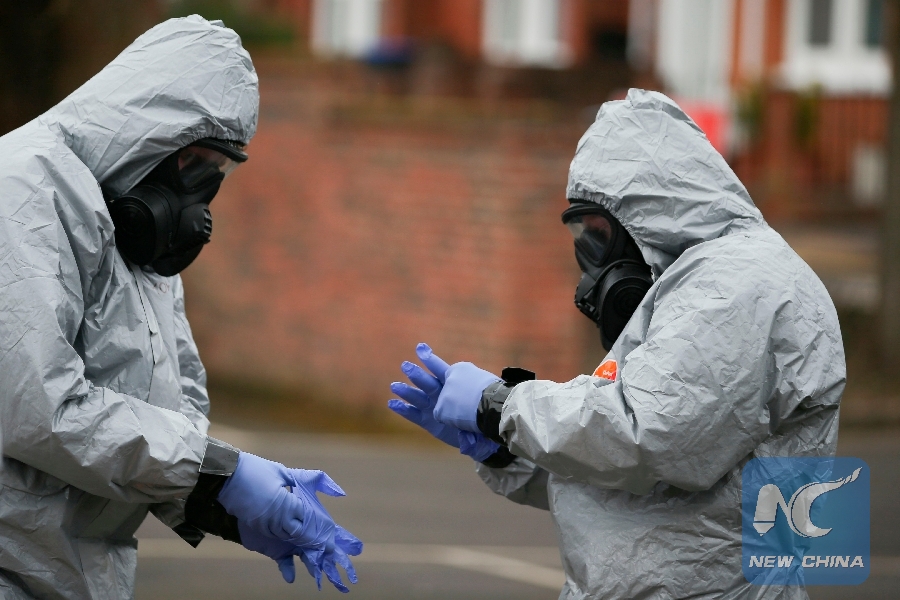
File Photo: Military personnel wearing protective coveralls work to remove vehicles from a cordoned off area behind a police station in Salisbury, southern England, on March 11, 2018, as investigations and operations continue in connection with the major incident sparked after a man and a woman were apparently poisoned in a nerve agent attack a week ago. (Xinhua/AFP)
WASHINGTON, Oct. 31 (Xinhua) -- The U.S. State Department said Wednesday that Washington will decide next month whether to impose the second round of sanctions against Moscow over an alleged poison attack on a former Russian spy.
"The Chemical and Biological Weapons Act mandates that the State Department certify to the Congress whether Russia has met conditions required by the law three months after the initial determination of the Skripal case," Robert Palladino, deputy spokesperson of the State Department, said in a press briefing.
"Now, that initial determination was made August 6, and that takes us to November 6, which is the certification deadline," he said. "So November 6, that's the deadline by which the Department of State must certify to the Congress that Russia has met the conditions in the Chemical and Biological Weapons Act."
"The conditions that we would have to certify are that Russia has ceased and assured that it will not use chemical weapons again, and that it has allowed international inspectors to verify those assurances," he explained.
"So have they taken the steps to get back into compliance is the issue. And if we can't make such a certification, the State Department is required to impose a second round of sanctions after consultations with the Congress," he said.
However, he refused to tell what sanction measures the United States would take.
Before the first batch of sanctions on Russia came into effect in August, the United States had threatened to impose stricter sanctions on Russia three months after the first batch was implemented, if Moscow failed to agree not to use biochemical weapons on its nationals, provide credible assurance of not engaging in such behavior in the future, and allow third-party observers to verify Russia's actions on-site.
However, Christopher Ford, assistant secretary of state, said while announcing the first group of sanctions that "these measures ... will remain in place for at least one year and until further notice," backing off from the agency's previously set deadline.
Former Russian double agent Sergei Skripal, aged 66, and his daughter Yulia, were found unconscious on a bench outside a shopping center in Britain's southwestern city of Salisbury on March 4. Britain claimed the pair was exposed to a nerve agent and holds Russia responsible, while the Russian government has denied any involvement in it.
The U.S. Federal Register said in a notice on Aug. 27 that the U.S. sanctions came into effect on the same day, as the Department of State has determined that "the Government of the Russian Federation has used chemical weapons in violation of international law or lethal chemical weapons against its own nationals."
Under the sanction regime, U.S. foreign assistance, the licensing of defense articles and services, and the licensing of national security-sensitive goods and technology concerning effort to Russia would be banned.
Russia will also be denied "any credit, credit guarantees, or other financial assistance by any department, agency, or instrumentality of the United States Government, including the Export-Import Bank of the United States."
For its part, Russia blasted the U.S. sanctions, saying Moscow will "withstand" the U.S. moves and respond to Washington's "brute pressure."

